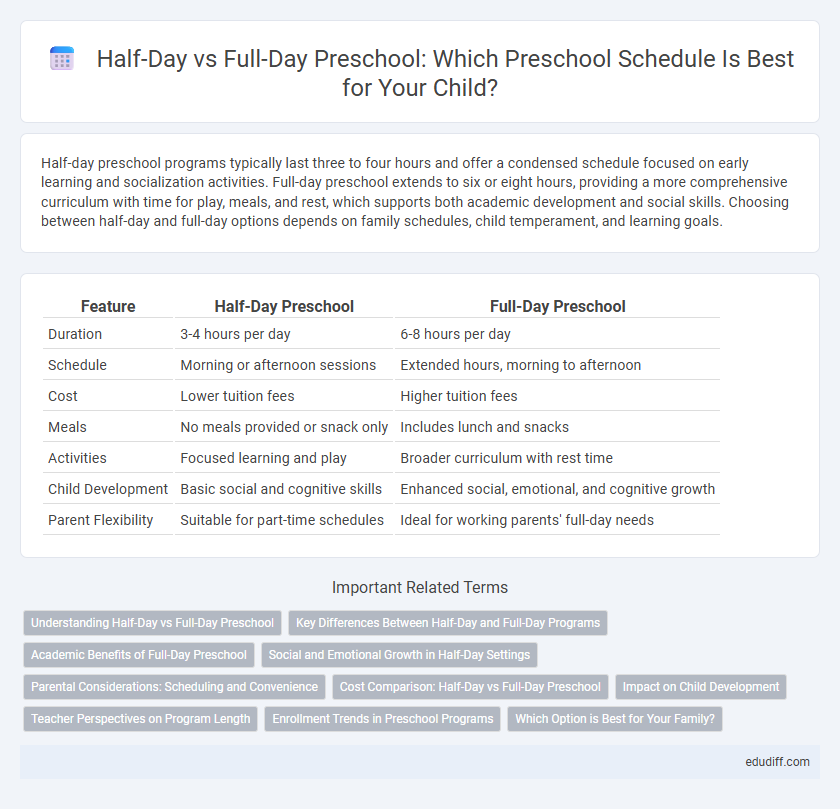Half-day preschool programs typically last three to four hours and offer a condensed schedule focused on early learning and socialization activities. Full-day preschool extends to six or eight hours, providing a more comprehensive curriculum with time for play, meals, and rest, which supports both academic development and social skills. Choosing between half-day and full-day options depends on family schedules, child temperament, and learning goals.
Table of Comparison
| Feature | Half-Day Preschool | Full-Day Preschool |
|---|---|---|
| Duration | 3-4 hours per day | 6-8 hours per day |
| Schedule | Morning or afternoon sessions | Extended hours, morning to afternoon |
| Cost | Lower tuition fees | Higher tuition fees |
| Meals | No meals provided or snack only | Includes lunch and snacks |
| Activities | Focused learning and play | Broader curriculum with rest time |
| Child Development | Basic social and cognitive skills | Enhanced social, emotional, and cognitive growth |
| Parent Flexibility | Suitable for part-time schedules | Ideal for working parents' full-day needs |
Understanding Half-Day vs Full-Day Preschool
Half-day preschool programs typically run for 3 to 4 hours, focusing on foundational social, emotional, and cognitive skills, ideal for younger children or those easing into a school environment. Full-day preschool extends to 6 to 8 hours, incorporating more comprehensive activities, meals, and rest periods, supporting working parents and promoting deeper learning experiences. Choosing between half-day and full-day preschool depends on the child's temperament, family schedule, and educational goals, with both formats providing essential early childhood development benefits.
Key Differences Between Half-Day and Full-Day Programs
Half-day preschool programs typically last around 3 to 4 hours, focusing on early socialization, basic academic skills, and play-based learning, which suits families seeking flexible schedules. Full-day preschool extends to 6 to 8 hours, offering a more structured environment with additional activities such as lunch, naps, and enrichment programs that support comprehensive child development. The choice between half-day and full-day depends largely on parental work schedules, child readiness, and the desired intensity of early childhood education.
Academic Benefits of Full-Day Preschool
Full-day preschool programs offer extended learning opportunities that significantly enhance early childhood development, including improved language acquisition and stronger foundational skills in math and literacy. Children attending full-day sessions demonstrate better cognitive and social-emotional growth due to prolonged engagement with structured activities and peer interaction. Studies indicate that full-day preschool attendance correlates with higher readiness for kindergarten and long-term academic achievement.
Social and Emotional Growth in Half-Day Settings
Half-day preschool programs foster social and emotional growth by providing a balanced environment where children engage in structured activities and have ample time for independent play and rest, reducing overstimulation. The shorter duration encourages positive peer interactions and helps children develop self-regulation skills with less fatigue compared to full-day programs. Research shows that half-day settings often support stronger emotional resilience and social adaptability in early childhood development.
Parental Considerations: Scheduling and Convenience
Parents often weigh scheduling flexibility and convenience when choosing between half-day and full-day preschool programs. Half-day preschools typically align better with parents who have flexible work hours or prefer more at-home time, while full-day options support families needing extended child care due to full-time work commitments. Transportation, meal provision, and potential impact on family routines also influence the decision, making parental lifestyle and work schedules critical factors in selecting the appropriate preschool format.
Cost Comparison: Half-Day vs Full-Day Preschool
Half-day preschools typically cost 30-50% less than full-day programs, making them a more budget-friendly option for families seeking early childhood education. Full-day preschools often include meals, extended care, and enrichment activities that justify their higher tuition fees ranging from $7,000 to $12,000 annually on average. Cost comparison should also consider potential subsidies, location-based price variations, and the value of additional services when choosing between half-day and full-day options.
Impact on Child Development
Half-day preschool programs offer young children focused learning opportunities that support socialization and basic skill development in shorter sessions, fostering independence and adaptability. Full-day preschool provides extended hours that promote cognitive growth, emotional regulation, and sustained social interaction, allowing for a more comprehensive curriculum that includes play-based and academic activities. Research indicates full-day attendance often correlates with improved language acquisition, attention span, and readiness for kindergarten, whereas half-day programs benefit families seeking less intensive schedules.
Teacher Perspectives on Program Length
Teachers observe that half-day preschool programs often allow for more focused, intensive learning sessions, promoting better retention for young children. Full-day preschools provide extended interaction time, supporting social development and offering opportunities for diverse activities, crucial for holistic growth. Educators emphasize that program length should align with developmental needs and family preferences to maximize educational outcomes.
Enrollment Trends in Preschool Programs
Enrollment trends reveal a growing preference for full-day preschool programs, driven by parents' demand for extended early learning opportunities and convenience for working families. Data from the National Center for Education Statistics indicates a steady rise in full-day enrollment, with over 60% of preschoolers attending full-day sessions as of 2023. Despite this, half-day preschool remains popular in certain regions due to cost considerations and family schedules, maintaining a significant share of overall enrollment.
Which Option is Best for Your Family?
Choosing between half-day and full-day preschool depends on your family's schedule, child's temperament, and developmental needs. Half-day programs typically offer 3-4 hours of structured learning, promoting social skills and early literacy without overwhelming young children, ideal for families seeking flexibility. Full-day preschools provide extended care up to 8 hours, supporting working parents with comprehensive activities that enhance cognitive, emotional, and motor development throughout the day.
Half-day preschool vs Full-day preschool Infographic

 edudiff.com
edudiff.com